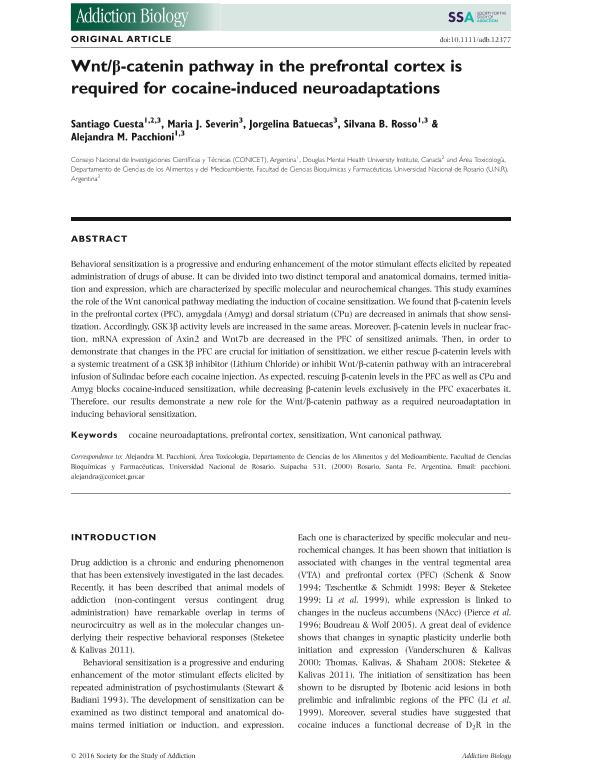Artículo
Wnt/β-catenin pathway in the prefrontal cortex is required for cocaine-induced neuroadaptations
Cuesta, Santiago ; Severin, María Julia
; Severin, María Julia ; Batuecas, Jorgelina; Rosso, Silvana Beatriz
; Batuecas, Jorgelina; Rosso, Silvana Beatriz ; Pacchioni, Alejandra Maria
; Pacchioni, Alejandra Maria
 ; Severin, María Julia
; Severin, María Julia ; Batuecas, Jorgelina; Rosso, Silvana Beatriz
; Batuecas, Jorgelina; Rosso, Silvana Beatriz ; Pacchioni, Alejandra Maria
; Pacchioni, Alejandra Maria
Fecha de publicación:
07/2017
Editorial:
Wiley Blackwell Publishing, Inc
Revista:
Addiction Biology
ISSN:
1355-6215
Idioma:
Inglés
Tipo de recurso:
Artículo publicado
Clasificación temática:
Resumen
Behavioral sensitization is a progressive and enduring enhancement of the motor stimulant effects elicited by repeated administration of drugs of abuse. It can be divided into two distinct temporal and anatomical domains, termed initiation and expression, which are characterized by specific molecular and neurochemical changes. This study examines the role of the Wnt canonical pathway mediating the induction of cocaine sensitization. We found that β-catenin levels in the prefrontal cortex (PFC), amygdala (Amyg) and dorsal striatum (CPu) are decreased in animals that show sensitization. Accordingly, GSK3β activity levels are increased in the same areas. Moreover, β-catenin levels in nuclear fraction, mRNA expression of Axin2 and Wnt7b are decreased in the PFC of sensitized animals. Then, in order to demonstrate that changes in the PFC are crucial for initiation of sensitization, we either rescue β-catenin levels with a systemic treatment of a GSK3β inhibitor (Lithium Chloride) or inhibit Wnt/β-catenin pathway with an intracerebral infusion of Sulindac before each cocaine injection. As expected, rescuing β-catenin levels in the PFC as well as CPu and Amyg blocks cocaine-induced sensitization, while decreasing β-catenin levels exclusively in the PFC exacerbates it. Therefore, our results demonstrate a new role for the Wnt/β-catenin pathway as a required neuroadaptation in inducing behavioral sensitization.
Archivos asociados
Licencia
Identificadores
Colecciones
Articulos(CCT - ROSARIO)
Articulos de CTRO.CIENTIFICO TECNOL.CONICET - ROSARIO
Articulos de CTRO.CIENTIFICO TECNOL.CONICET - ROSARIO
Citación
Cuesta, Santiago; Severin, María Julia; Batuecas, Jorgelina; Rosso, Silvana Beatriz; Pacchioni, Alejandra Maria; Wnt/β-catenin pathway in the prefrontal cortex is required for cocaine-induced neuroadaptations; Wiley Blackwell Publishing, Inc; Addiction Biology; 22; 4; 7-2017; 933-945
Compartir
Altmétricas



